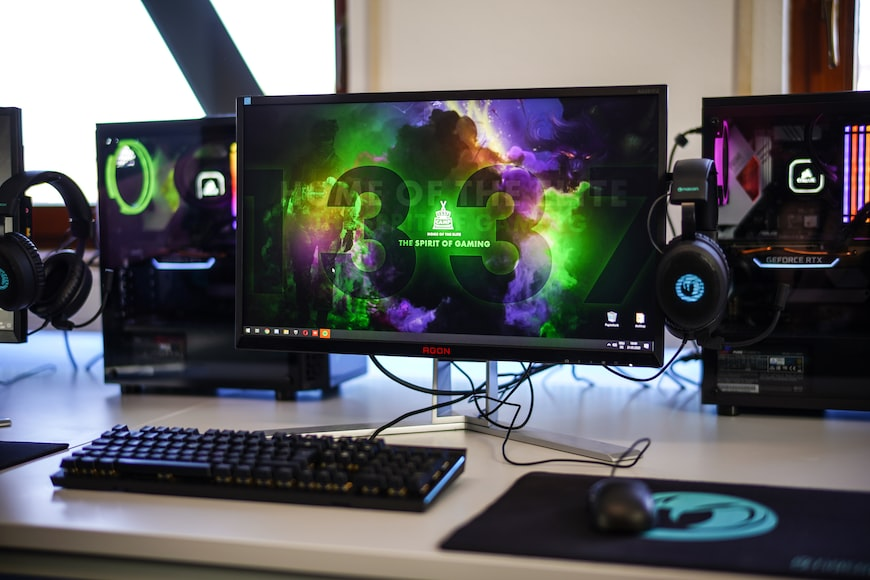Personalization in gaming with AI: The key to enhancing player experience
Learn how AI is being used to personalize gaming experiences and enhance player engagement
KEY TAKEAWAYS
- AI-driven personalization has the potential to revolutionize the gaming industry.
- AI-driven personalization can provide a more immersive and engaging player experience.
- AI-driven personalization can help create dynamic content tailored to the individual user.
- AI-driven personalization can help developers accurately measure and track user behavior.
- AI-driven personalization is key to enhancing the user experience in modern gaming.
The gaming industry has seen unprecedented growth in recent years, and personalization has become a crucial aspect of gaming. Personalization in gaming refers to the ability of game developers to tailor gameplay experiences to individual players, providing them with a unique and engaging experience. In recent times, the use of artificial intelligence (AI) in gaming personalization has become increasingly popular. AI can analyze vast amounts of player data and provide personalized gaming experiences that enhance player engagement and satisfaction. This article will explore the importance of personalization in gaming, the role of AI in player experience, the different AI techniques for personalization in gaming, and examples of games that have successfully implemented AI for personalization. You’ll learn more about the future of personalization in gaming with AI and the opportunities and challenges it presents.
Types of Personalization in Gaming
Personalization is a crucial aspect of gaming, and the integration of AI technology has revolutionized the gaming experience. With AI, game developers can personalize the gaming experience for each player, making the game more engaging and enjoyable. In the context of gaming, personalization can be divided into two categories: in-game personalization and out-of-game personalization.
In-game personalization
In-game personalization involves customizing the gameplay experience for each player. AI algorithms analyze player behavior and preferences to tailor the game to the individual’s needs. For example, AI can adjust the difficulty level of a game to match the player’s skill level, provide personalized hints and tips, or adjust the game’s storyline to match the player’s choices and actions.
In-game personalization can also include visual and audio customization. AI can adjust the game’s graphics and sound effects based on the player’s preferences, making the game more immersive and enjoyable.
Out-of-game personalization
Out-of-game personalization refers to customization outside of the game itself. This includes personalizing the game’s interface, such as adjusting the font size or color scheme to match the player’s preferences. It can also include recommending games and game content based on the player’s interests and previous gameplay.
Artificial intelligence in gaming personalization has made it possible to enhance the player experience to an unprecedented level. By personalizing the gameplay experience, AI technology can create a more immersive, enjoyable, and engaging gaming experience for players. Personalization in gaming with AI is indeed the key to enhancing the player experience.
Benefits of Personalization in Gaming
Personalization in gaming with Artificial Intelligence (AI) allows game developers to create a more engaging and rewarding experience for their players. It can help increase player engagement and retention, as well as lead to higher player satisfaction and loyalty. In addition, it can open up new monetization opportunities for game developers.
Increased Player Engagement and Retention
Personalization in gaming with AI allows game developers to tailor their games to individual players. This can help increase the level of engagement and retention, as players are more likely to stay interested and engaged in the game when it is tailored to their individual preferences and playstyles. AI-based personalization also allows game developers to update their games more frequently, as they can quickly analyze player data and make adjustments accordingly.

Photo: Ella Don
Higher Player Satisfaction and Loyalty
When games are personalized with AI, players are more likely to feel satisfied and loyal to the game. This is because they are getting a personalized experience tailored to their individual needs and preferences, which can lead to a more enjoyable and rewarding gaming experience. AI-based personalization can also help game developers create more immersive and engaging gaming experiences, as they can create tailored storylines and update the game with new content based on player data.
Better Monetization Opportunities for Game Developers
Personalization in gaming with AI can also open up new opportunities for game developers to monetize their games. By tailoring their games to individual players, game developers can provide more targeted advertisements and in-app purchases, leading to more revenue. AI-based personalization also allows game developers to quickly adjust their monetization strategies based on player data, giving them more flexibility in their monetization efforts.
AI and Personalization in Gaming
Artificial Intelligence (AI) has been revolutionizing the gaming industry, and personalization is one of the key areas where AI has made a significant impact. Personalization in gaming refers to tailoring the game experience to the individual player, creating a unique and engaging experience. With AI, game developers can gather data about each player’s preferences and behaviors, and use that information to provide personalized gameplay experiences.
How AI can be used for personalization in gaming
AI can be used to personalize gaming experiences in several ways. For example, AI algorithms can analyze player behavior in real-time to dynamically adjust the difficulty level of the game. This ensures that the game remains challenging, but not too difficult to play. AI can also be used to personalize in-game rewards and quests, based on the player’s preferences and playing style.
Another way AI can be used for personalization in gaming is through player modeling. AI algorithms can analyze the player’s behavior, preferences, and skill level to create a personalized profile. This profile can then be used to tailor the game experience to the player’s unique preferences.
Different AI techniques for personalization in gaming
Several AI techniques can be used for personalization in gaming. One of the most common is machine learning, which is a type of AI that allows algorithms to learn and improve over time. Machine learning can be used to analyze player data and create personalized game experiences based on that data.
Another technique is reinforcement learning, which involves training AI algorithms to make decisions based on feedback. Reinforcement learning can be used to personalize game difficulty levels, rewards, and other aspects of the gameplay experience.
Natural language processing (NLP) is another AI technique that can be used for personalization in gaming. NLP algorithms can analyze player text and voice chat logs to gain insight into their preferences and behaviors. This information can be used to tailor the game experience to the player’s unique personality and style of communication.
AI Techniques for Personalization in Gaming
AI has become a powerful tool for personalizing gaming experiences and enhancing player engagement. AI-driven technologies such as Reinforcement Learning, Deep Learning, and Natural Language Processing (NLP) have enabled developers to create personal and immersive gaming experiences tailored to each player’s preferences and interests.
Reinforcement Learning
Reinforcement Learning (RL) is a type of AI that enables agents to learn through trial and error. It allows game developers to design a virtual environment in which AI-driven agents can interact with the environment and receive rewards based on their behavior. By learning through experience, reinforcement learning can help game developers create personalized gaming experiences. For example, a game developer could use RL to create an AI agent that learns how to adjust the difficulty of the game based on the player’s skill level. This would allow the game to become more challenging as the player progresses. RL can also be used to create personalized in-game experiences, such as customizing the AI opponents and their behavior.
Deep Learning
Deep Learning is a subset of machine learning that enables machines to learn with minimal human intervention. Deep Learning algorithms can be used to create personalized gaming experiences by analyzing large sets of data and making predictions. For example, a game developer may use a Deep Learning algorithm to analyze a player’s past gameplay and generate customized in-game content or suggest new game features that the player may enjoy. Deep Learning algorithms can also be used to create AI-driven bots that can interact with players, providing them with personalized tips or advice.
Natural Language Processing (NLP)
Natural Language Processing (NLP) is a type of AI that enables machines to understand and interact with human language. NLP can be used to create immersive gaming experiences by allowing players to interact with the game using natural language. For example, a game developer could use NLP to create a virtual assistant that can understand and respond to players’ requests in real time. This could allow players to ask for in-game help or request specific game content. NLP can also be used to generate personalized dialogue and conversations, allowing players to engage with the game in a more immersive and engaging way.
Examples of Personalization in Gaming with AI
The use of Artificial Intelligence (AI) in gaming has been growing in popularity over the past few years, as it allows for a more personalized gaming experience. AI-powered personalization is becoming increasingly important in gaming, as it allows for an immersive and tailored experience for each player. Here are a few examples of games that are using AI for personalization and how it is enhancing the player experience.
- Overwatch
Blizzard Entertainment’s first-person shooter game Overwatch has been using AI for personalization since its release in 2016. The game’s AI-driven system is designed to create a more personalized user experience by using machine learning to identify the player’s skill level and tailor the game accordingly. This means that the game will dynamically adjust the difficulty level of the opponents and the overall gaming experience to match the player’s skill level. The AI-powered system also allows for a more tailored experience for each player, as it can detect their unique playing style and adapt the game accordingly.
- FIFA 17
EA Sports soccer video is popular among gamers. FIFA 17 is an example of how AI can be used to personalize the gaming experience. The game uses AI to provide players with a personalized in-game experience based on their playing style and preferences. The AI-driven system can recognize the specific skills and strategies that each player is using and dynamically adjust the difficulty level and opponents accordingly. This allows for a more realistic and tailored gaming experience that is tailored to each player.
- Elite: Dangerous
Elite: Dangerous is a space simulation game that has been using AI for personalization since its release in 2014. The game uses an AI-driven system to provide players with a personalized experience by adjusting the difficulty level, opponents, and overall gaming experience based on the player’s skill level and playing style. This allows for a more immersive and tailored gaming experience that is tailored to each player.
Final Thoughts
You should now have a better understanding of how artificial intelligence can revolutionize the gaming industry and enhance the player experience. With AI, games can be personalized to suit the individual needs and preferences of each player, resulting in a more engaging and immersive experience. By utilizing different AI techniques such as machine learning and natural language processing, gaming companies can create games that adapt and evolve based on the behavior and feedback of players. The integration of artificial intelligence in gaming personalization has the potential to create an entirely new gaming landscape that is tailored to each player. So next time you pick up a controller, remember the impact that AI can have on your gaming experience


































Comment Template